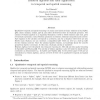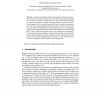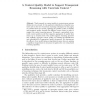372 search results - page 36 / 75 » Qualitative Reasoning |
ECAI
2010
Springer
13 years 5 months ago
2010
Springer
Bipolarity is an important feature of spatial information, involved in the expression of preferences and constraints about spatial positioning or in pairs of opposite spatial relat...
IJCAI
1993
13 years 9 months ago
1993
We describe a new approach to default reasoning, based on a principle of indi erence among possible worlds. We interpret default rules as extreme statistical statements, thus obta...
AIR
2005
13 years 7 months ago
2005
Qualitative temporal and spatial reasoning is in many cases based on binary relations such as before, after, starts, contains, contact, part of, and others derived from these by r...
RSCTC
2000
Springer
13 years 11 months ago
2000
Springer
Abstract. In spatial reasoning the qualitative description of relations between spatial regions is of practical importance and has been widely studied. Examples of such relations a...
QUACON
2009
Springer
14 years 2 months ago
2009
Springer
Much research on context quality in context-aware systems divides into two strands: (1) the qualitative identi
cation of quality measures and (2) the use of uncertain reasoning tec...



